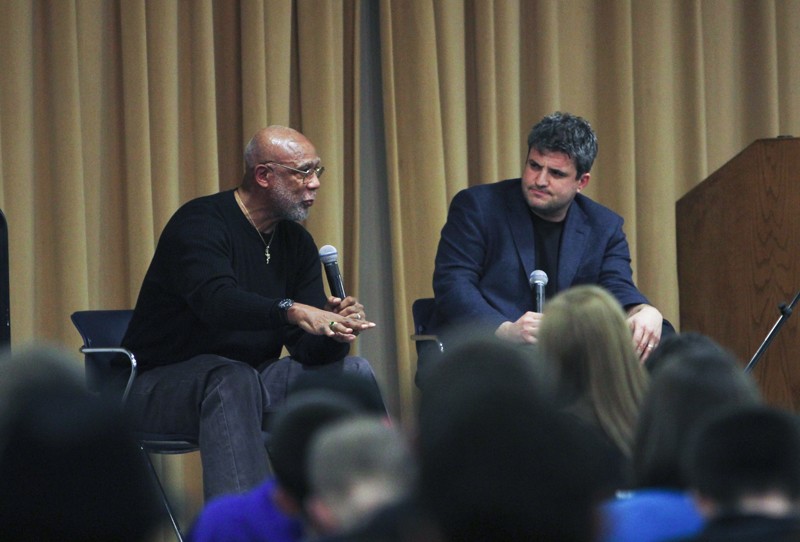Olympic athlete brings racial, political insight to GV

GVL / Robert Mathews Not Just a Game: Politics and Power in American Sports with John Carlos and Dave Zirin.
Feb 6, 2012
The two hour-long, standing-room only conversation between Olympian John Carlos and author Dave Zirin at “Not Just a Game: Politics and Power in American Sports” on Feb. 2 didn’t touch much on athletics, but athletics weren’t the point.
The event wasn’t about Carlos’ efforts in the 1968 Summer Olympics or his bronze medal in the 200-meter dash that year, it was his involvement in the civil rights movement and how his impact from that day in Mexico City is still felt today.
Carlos stood with American teammate Tommie Smith, the gold medalist, on the medal podium and as the American flag was raised, the duo each raised a fists in the air, signifying racial solidarity and creating one of the most memorable moments in civil right’s history.
“It wasn’t about the medal, there was no need to suffice my taste buds for an Olympic medal, it was required by Olympic rules and regulations, you had to have a medal to reach the victory stand,” Carlos said. “To be able to make a statement, you cannot forget those who are less fortunate, those have been mistreated.”
Villainized for his actions, Carlos has spent his post-Olympic life speaking about the civil rights movement and what his actions in Mexico City really meant. His presentation here at Grand Valley State University touched on a number of subjects, most notably his relationship with both Martin Luther King, Jr., and Malcolm X.
Growing up in Harlem, Carlos met Malcolm X at a speaking engagement and developed a bond with the human right’s activist until his death in 1965.
Prior to the Olympics, Carlos was also called to meet with Martin Luther King, Jr. There, he discussed King’s support of an Olympic boycott, something King would publicly announce after his trip to Memphis, Tenn., during which he was assassinated.
Carlos spoke highly of King’s courage as well, and said he lowered his glasses to make true eye-to-eye contact with him during their conversation where King spoke of death threats he faced in his upcoming trip.
“When a man tells you they have a bullet with your name on it, you should be afraid,” Carlos said. “When I looked in Dr. King’s eyes, you know what I saw? Love, love for humanity.”
Growing up on the streets of Harlem, New York, Carlos told the audience of his family and upbringing. Whether it be joking about the time he set fire to the trees in front of his housing complex because the landlord wouldn’t spray for caterpillars or the fact that he gave that same land lord a 48-hour ultimatum, something his father would tell him when he did something wrong, the audience had its fair share of laughter.
Along with discussions of his past and his book “The John Carlos Story: The Sports Movement That Changed the World,” Carlos touched on issues today like Occupy movements – offering advice to protestors on Wall Street.
“Why am I here? Because I am you … as you stand here right now, remember what you are fighting for is not for you,” Carlos said. “You are the catalyst to have it better for your kids down the line.”
Students also found appreciation for Carlos’ efforts at the presentation. Despite the event happening 43 years ago, the impact was still felt and Carlos supported here at GVSU.
“He’s a guy that kind of gets overlooked in the realm of sports,” said junior Pete Barrows. “He was a person who was really down to earth … I think that is a preferable way to go about giving a message as opposed to getting up on a pedestal and preaching your stuff.”






















